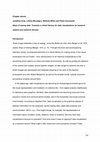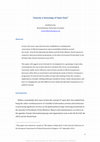Papers by jonathan W . Y . gray

In the digital age, data visualisations are becoming an increasingly prominent genre for the repr... more In the digital age, data visualisations are becoming an increasingly prominent genre for the representation and mediation of collective life – from digital analytics dashboards to interactive news graphics. At the same time they are becoming more and more popular as methods in media and communications studies as well as in humanities and social science research more broadly. Inspired by John Berger’s work to develop a critical literacy for visual culture, this chapter aims to contribute towards a critical literacy for data visualisations. In particular we argue for “methodological reflexivity” (Agre, 1997; Rieder and Röhle, 2012) around the use of data visualisations in research as both instruments and objects of study. We develop a heuristic framework for studying three forms of mediation which data visualisations enact – drawing on research and insights from new media studies, science and technology studies, the history and philosophy of science, cultural studies and critical social theory. We illustrate these three forms of mediation with an analysis of visualisations of public finances from civil society organisations, media outlets and public institutions. We conclude with some thoughts towards a broader programme of critical literacy for reading and doing research with data visualisations.

No doubt, networks have become indispensable mathematical tools in many aspects of life in the tw... more No doubt, networks have become indispensable mathematical tools in many aspects of life in the twenty first century. They allow us to calculate all kinds of relational metrics and to quantify the properties of their nodes, clusters and global structures. These modes of calculation are becoming increasingly prevalent in an age of digital data. But networks are more than formal analytical tools. They are also powerful metaphors of our collective life, with all of its complexity and its many dependencies. This is why, among the various strategies of data visualization, networks seem to have assumed a paradigmatic position, spreading to the most different disciplines and colonizing sometimes as mere decoration a growing number of digital and non-digital objects. Contemplating the visual representation of a network, we don’t (always) need to compute its mathematical properties to appreciate its heuristic value – as anyone who has ever used a transportation plan knows well. Networks are extraordinary calculating devices, but they are also maps, instruments of navigation and representation. Not only do they guide our steps through the territories that they represent, but they also invite our imagination to see and explore the world in different ways.

The Routledge Handbook to Developments in Digital Journalism Studies
Networks are classic but under-acknowledged figures of journalistic storytelling. Who is connecte... more Networks are classic but under-acknowledged figures of journalistic storytelling. Who is connected to whom and by which means? Which organizations receive support from which others? What resources or information circulate through which channels and which intermediaries enable and regulate their flows? These are all customary stories and lines of inquiry in journalism and they all have to do with networks. Additionally, the recent spread of digital media has increasingly confronted journalists with information coming not only in the traditional form of statistic tables, but also of relational databases. Yet, journalists have so far made little use of the analytical resources offered by networks. To address this problem in this chapter we examine how " visual network exploration " may be brought to bear in the context of data journalism in order to explore, narrate and make sense of large and complex relational datasets. We borrow the more familiar vocabulary of geographical maps to show how key graphical variables such as position, size and hue can be used to interpret and characterise graph structures and properties. We illustrate this technique by taking as a starting point a recent example from journalism, namely a catalogue of French information sources compiled by Le Monde's The Decodex. We establish that good visual exploration of networks is an iterative process where practices to demarcate categories and territories are entangled and mutually constitutive. To enrich investigation we suggest ways in which the insights of the visual exploration of networks can be supplemented with simple calculations and statistics of distributions of nodes and links across the network. We conclude with reflection on the knowledge-making capacities of this technique and how these compare to the insights and instruments that journalists have used in the Decodex project – suggesting that visual network exploration is a fertile area for further exploration and collaborations between data journalists and digital researchers.

Open data advocates and initiatives often focus on the “release”, “publication”, “disclosure” and... more Open data advocates and initiatives often focus on the “release”, “publication”, “disclosure” and “opening up” of pre-existing public sector datasets, and the character of this release – for example, through the use of open data licenses or legal waivers, and publication in machine readable formats.
In this paper we seek to highlight and explore other forms of intervention into the information infrastructures that underpin the production of public information, beyond the disclosure of datasets. We explore these issues with reference to a case study on recent advocacy around information about the ownership of companies in the UK, drawing on a mixture of primary data from interviews with practitioners, and secondary data from the literature, mailing list archives, policy and advocacy briefings, consultation responses, press releases, media articles, video recordings, parliamentary transcripts and official announcements.
We will conclude with a discussion of how open data advocates and initiatives might learn from this example, including thoughts on broadening the politics of public information from a focus on the disclosure of datasets to democratic interventions to reshape information infrastructures as socio-technical systems.
Working paper presented at the Open Data Research Symposium at the 3rd International Open Government Data Conference in Ottawa, on May 27th 2015.
Available at SSRN: http://ssrn.com/abstract=2610937

In just a few years, open data has been established as a fundamental cornerstone of official tran... more In just a few years, open data has been established as a fundamental cornerstone of official transparency and accountability initiatives around the world - from US President Barack Obama and UK Prime Minister David Cameron's respective open government programmes, to the Open Government Partnership, to the G8 Open Data Charter launched in June 2013.
This paper will suggest several threads for investigation for a genealogy of open data, examining how the rise of open data has coincided with a focus on technological innovation, public sector efficiency and economic growth in official transparency discourse rather than on social justice and meeting the needs of citizens. It proposes a programme of research into the politics of open data looking at how the concept is implicated in a broader, shifting landscape of political visions, values and practises, and how it is changing the way that different actors think and talk about transparency as a political concept.
The paper was given at the General Conference of the European Consortium for Political Research in Glasgow, 3-6th September 2014.

In this chapter I shall examine some of Johann Georg Hamann’s claims about how philosophers misus... more In this chapter I shall examine some of Johann Georg Hamann’s claims about how philosophers misuse, misunderstand, and are misled by language. I will then examine how he anticipates things that Friedrich Nietzsche and Ludwig Wittgenstein say on this topic. All three thinkers are suspicious of philosophers who consider artificial systems of “pure reason” or “formal logic” more valuable than natural language in the search for philosophical insight. They all challenge the notion that natural language “gets in the way” of reason, and should be radically formalized into (or even retired in favor of) a more logically or conceptually perfect language. Hamann is responding to the enthusiasm for reine Vernunft exhibited by his friend Immanuel Kant and the loose-knit group that would later come to be known as the Aufklärer. Nietzsche is profoundly critical of the idealism of many of his philosophical predecessors, including Kant, Hegel, and Schopenhauer. Wittgenstein turns away from Frege’s and Russell’s logical philosophies, and rejects the British idealism (deeply influenced by Kant and Hegel) that had been dominant in earlier decades.
Hamann, Nietzsche, and Wittgenstein all contend that reason and logic come from and are dependent upon natural language, which changes over time, and which responds to the interests and circumstances of its users. They all suggest that philosophers can benefit from a richer and more nuanced awareness of how our concepts and the ways in which we reason are born out of language, which is a complex, dynamic, variegated phenomenon, reflecting the complex, dynamic, variegated nature of human life and behavior.
While the extent to which one can trace direct lines of influence from Hamann to Nietzsche to Wittgenstein is debatable, Hamann was an important influence on the post-Kantian German philosophical landscape which informed Nietzsche’s and Wittgenstein’s work. While Nietzsche and Wittgenstein are often effectively regarded as isolates, much is to be gained by examining the rich tradition in which they stand. This essay strives to flesh out and examine three small episodes in a much bigger story about the turn to language in German philosophy.
A review of David M. Berry’s Critical Theory and the Digital (London: Bloomsbury, 2014) and Chris... more A review of David M. Berry’s Critical Theory and the Digital (London: Bloomsbury, 2014) and Christian Fuchs’s Social Media: A Critical Introduction (London: Sage, 2014) which was published in Krisis: Journal for Contemporary Philosophy 2015, Issue 1.
Books by jonathan W . Y . gray
A Field Guide to Fake News explores the use of digital methods to trace the production, circulati... more A Field Guide to Fake News explores the use of digital methods to trace the production, circulation and reception of fake news online.
It is a project of the Public Data Lab with support from First Draft.
Reports by jonathan W . Y . gray

The information systems of public institutions play a crucial role in how we collectively look at... more The information systems of public institutions play a crucial role in how we collectively look at and act in the world. They shape the way decisions are made, progress is evaluated, resources are allocated, issues are flagged, debates are framed and action is taken. As a United Nations (UN) report recently put it, “Data are the lifeblood of decision-making and the raw material for accountability.” [1] Every information system renders certain aspects of the world visible and lets others recede into the background. Datasets highlight some things and not others. They make the world comprehensible and navigable in their own way – whether for the purposes of policy evaluation, public service delivery, administration or governance. Given the critical role of public information systems, what happens when they leave out parts of the picture that civil society groups consider vital? What can civil society actors do to shape or influence these systems so they can be used to advance progress around social, democratic and environmental issues? This report looks at how citizens and civil society groups can generate data as a means to influence institutional data collection. In the following pages, we profile citizen-generated and civil society data projects and how they have been used as
advocacy instruments to change institutional data collection – including looking at the strategies, methods, technologies and resources that have been mobilised to this end. We conclude with a series of recommendations for civil society groups, public institutions, policy-makers and funders. The report was commissioned as part of a research series by DataShift, an initiative that builds the capacity and confidence of civil society organisations to produce and use citizen-generated data. It follows on from another recent discussion paper from Open Knowledge on what can be done to make the “data revolution” more responsive to the
interests and concerns of civil society, [2] as well as a briefing note by DataShift on how institutions can support sustainability of citizen-generated data initiatives. [3] The case studies here are based on qualitative, semi-structured interviews with people who have been directly involved with the projects. Potential case studies were shortlisted through snowball sampling drawing on a combination of interviews and digital methods. [4]









Uploads
Papers by jonathan W . Y . gray
In this paper we seek to highlight and explore other forms of intervention into the information infrastructures that underpin the production of public information, beyond the disclosure of datasets. We explore these issues with reference to a case study on recent advocacy around information about the ownership of companies in the UK, drawing on a mixture of primary data from interviews with practitioners, and secondary data from the literature, mailing list archives, policy and advocacy briefings, consultation responses, press releases, media articles, video recordings, parliamentary transcripts and official announcements.
We will conclude with a discussion of how open data advocates and initiatives might learn from this example, including thoughts on broadening the politics of public information from a focus on the disclosure of datasets to democratic interventions to reshape information infrastructures as socio-technical systems.
Working paper presented at the Open Data Research Symposium at the 3rd International Open Government Data Conference in Ottawa, on May 27th 2015.
Available at SSRN: http://ssrn.com/abstract=2610937
This paper will suggest several threads for investigation for a genealogy of open data, examining how the rise of open data has coincided with a focus on technological innovation, public sector efficiency and economic growth in official transparency discourse rather than on social justice and meeting the needs of citizens. It proposes a programme of research into the politics of open data looking at how the concept is implicated in a broader, shifting landscape of political visions, values and practises, and how it is changing the way that different actors think and talk about transparency as a political concept.
The paper was given at the General Conference of the European Consortium for Political Research in Glasgow, 3-6th September 2014.
Hamann, Nietzsche, and Wittgenstein all contend that reason and logic come from and are dependent upon natural language, which changes over time, and which responds to the interests and circumstances of its users. They all suggest that philosophers can benefit from a richer and more nuanced awareness of how our concepts and the ways in which we reason are born out of language, which is a complex, dynamic, variegated phenomenon, reflecting the complex, dynamic, variegated nature of human life and behavior.
While the extent to which one can trace direct lines of influence from Hamann to Nietzsche to Wittgenstein is debatable, Hamann was an important influence on the post-Kantian German philosophical landscape which informed Nietzsche’s and Wittgenstein’s work. While Nietzsche and Wittgenstein are often effectively regarded as isolates, much is to be gained by examining the rich tradition in which they stand. This essay strives to flesh out and examine three small episodes in a much bigger story about the turn to language in German philosophy.
Books by jonathan W . Y . gray
It is a project of the Public Data Lab with support from First Draft.
Reports by jonathan W . Y . gray
advocacy instruments to change institutional data collection – including looking at the strategies, methods, technologies and resources that have been mobilised to this end. We conclude with a series of recommendations for civil society groups, public institutions, policy-makers and funders. The report was commissioned as part of a research series by DataShift, an initiative that builds the capacity and confidence of civil society organisations to produce and use citizen-generated data. It follows on from another recent discussion paper from Open Knowledge on what can be done to make the “data revolution” more responsive to the
interests and concerns of civil society, [2] as well as a briefing note by DataShift on how institutions can support sustainability of citizen-generated data initiatives. [3] The case studies here are based on qualitative, semi-structured interviews with people who have been directly involved with the projects. Potential case studies were shortlisted through snowball sampling drawing on a combination of interviews and digital methods. [4]
In this paper we seek to highlight and explore other forms of intervention into the information infrastructures that underpin the production of public information, beyond the disclosure of datasets. We explore these issues with reference to a case study on recent advocacy around information about the ownership of companies in the UK, drawing on a mixture of primary data from interviews with practitioners, and secondary data from the literature, mailing list archives, policy and advocacy briefings, consultation responses, press releases, media articles, video recordings, parliamentary transcripts and official announcements.
We will conclude with a discussion of how open data advocates and initiatives might learn from this example, including thoughts on broadening the politics of public information from a focus on the disclosure of datasets to democratic interventions to reshape information infrastructures as socio-technical systems.
Working paper presented at the Open Data Research Symposium at the 3rd International Open Government Data Conference in Ottawa, on May 27th 2015.
Available at SSRN: http://ssrn.com/abstract=2610937
This paper will suggest several threads for investigation for a genealogy of open data, examining how the rise of open data has coincided with a focus on technological innovation, public sector efficiency and economic growth in official transparency discourse rather than on social justice and meeting the needs of citizens. It proposes a programme of research into the politics of open data looking at how the concept is implicated in a broader, shifting landscape of political visions, values and practises, and how it is changing the way that different actors think and talk about transparency as a political concept.
The paper was given at the General Conference of the European Consortium for Political Research in Glasgow, 3-6th September 2014.
Hamann, Nietzsche, and Wittgenstein all contend that reason and logic come from and are dependent upon natural language, which changes over time, and which responds to the interests and circumstances of its users. They all suggest that philosophers can benefit from a richer and more nuanced awareness of how our concepts and the ways in which we reason are born out of language, which is a complex, dynamic, variegated phenomenon, reflecting the complex, dynamic, variegated nature of human life and behavior.
While the extent to which one can trace direct lines of influence from Hamann to Nietzsche to Wittgenstein is debatable, Hamann was an important influence on the post-Kantian German philosophical landscape which informed Nietzsche’s and Wittgenstein’s work. While Nietzsche and Wittgenstein are often effectively regarded as isolates, much is to be gained by examining the rich tradition in which they stand. This essay strives to flesh out and examine three small episodes in a much bigger story about the turn to language in German philosophy.
It is a project of the Public Data Lab with support from First Draft.
advocacy instruments to change institutional data collection – including looking at the strategies, methods, technologies and resources that have been mobilised to this end. We conclude with a series of recommendations for civil society groups, public institutions, policy-makers and funders. The report was commissioned as part of a research series by DataShift, an initiative that builds the capacity and confidence of civil society organisations to produce and use citizen-generated data. It follows on from another recent discussion paper from Open Knowledge on what can be done to make the “data revolution” more responsive to the
interests and concerns of civil society, [2] as well as a briefing note by DataShift on how institutions can support sustainability of citizen-generated data initiatives. [3] The case studies here are based on qualitative, semi-structured interviews with people who have been directly involved with the projects. Potential case studies were shortlisted through snowball sampling drawing on a combination of interviews and digital methods. [4]